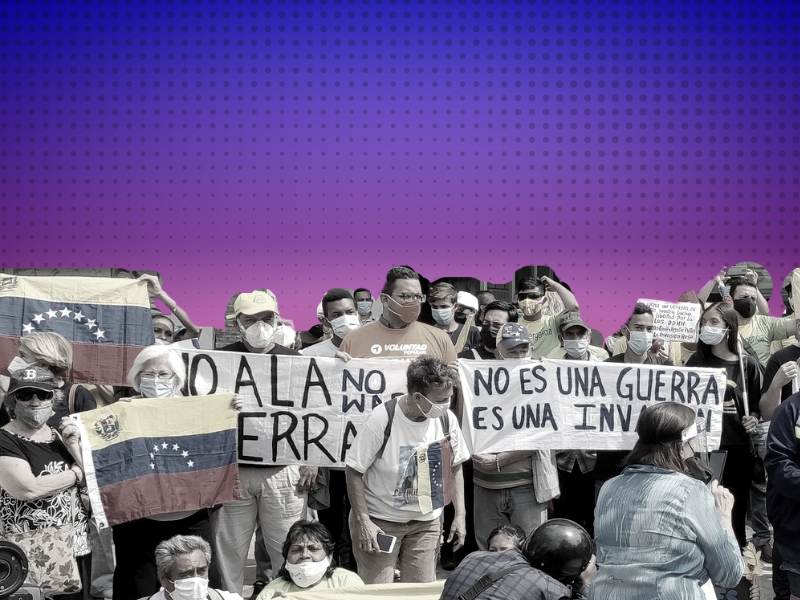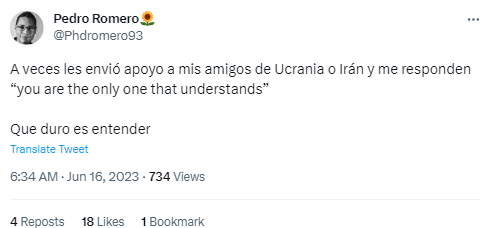
Edited image of an anti-war protest in Caracas, March 2022. Photo by José R. Camacho Keller/Reporte Ya, used with permission.
This interview is part of Undertones, Global Voices’ Civic Media Observatory‘s newsletter. Subscribe to Undertones.
Welcome back to Undertones, the newsletter diving into lesser-known narratives from around the world. This week we had the pleasure of speaking with one of our researchers, Alessandra Soler, a Venezuelan human rights and democracy activist, about how Venezuelans are reacting to Russia’s invasion of Ukraine. This is the last installment of our newsletter series on Russian narratives in Latin America.
Many might know that Venezuela openly supports Russia’s war on Ukraine. Last June, President Maduro officially sent “a hug of solidarity” to President Putin, a “brother of Venezuela.” However, other narratives from Venezuela have been drowned in these public performances.
“There is a need to differentiate between the Venezuelan government and the Venezuelan people, who have protested this war,” Soler says. This is what motivated her to work with the Civic Media Observatory and write the story “For Venezuelans, the invasion of Ukraine hits close to home” on Global Voices. Below is a Q&A delving into her research along with her media highlights.
Civic Media Observatory: Venezuelans were very active when the war first broke out. Are Venezuelans still talking about the war?
Alessandra Soler: At the beginning of the war, there were a series of organic protests against the war, mostly in Caracas. The conversation has continued ever since, especially when there is a new development, like for example during Ukraine’s Spring Offensive. All of these conversations are very tied to how Russia treats Ukraine, comparing it to Venezuela’s situation.
Both Putin and the Venezuelan government are under investigation by the International Criminal Court. It’s a point of connection. The conversations also happen on social media, where there is an interest in the outcome of the war and what that would mean for Venezuela as well.
Online, there are also discussions about the role of the [Russian state-funded mercenary company] Wagner group in Venezuela. Experts say that there may be as many as 400 Wagner mercenaries in Venezuela, but we can’t be completely certain. They are said to have protected Maduro during Venezuela’s political crisis in 2019. They also protect Russian interests in the country. After the 2018 elections, 2019 was the height of the crisis between Maduro and Juan Guaido, recognized as the interim president and who received a lot of international support.
CMO: Do you have an example of a recent media item expressing support for Ukraine?
AS: Yes, here is one from June this year that I have analyzed on Airtable.
 Translation of Tweet: Sometimes, I send my support to my friends from Ukraine or Iran and they respond to me “you are the only one that understands.” How hard it is to understand.
Translation of Tweet: Sometimes, I send my support to my friends from Ukraine or Iran and they respond to me “you are the only one that understands.” How hard it is to understand.
Subtext: Although Russia is not mentioned directly, it is implied as being the common denominator because it is an invasive force in Ukraine and a major ally and supporter of authoritarianism worldwide (hence the mention of Iran).
Asserted narrative: “Venezuela is also a victim of Russia”
CMO: What is an example of a narrative that is omnipresent?
AS: In the organic narratives, the war has served as a catalyst to speak about the role of Russia in Venezuela, especially militarily. The narrative of Venezuela being a victim of Russia is very strong. It is present in different social demographics.
CMO: How do people know about Russia’s military support of Maduro’s government?
AS: Any information that we get is from secondhand sources or from people who left the government because our government is so secretive about these relations. For the Venezuelan government, almost everything is a state secret.
And so civil society, like the association Vendata, has worked really hard to have a picture to know what the government is doing. The way to know what’s going on is to review the decades-long agreements between Russia and Venezuela.
CMO: How strong is Venezuelan-Russian propaganda?
AS: The propaganda is a lot about legitimizing Russia’s actions and the invasion, which requires countering the narratives of the U.S. and NATO. It’s also about showing that “the West is less powerful than what you think” because “Russia is supported internationally.” It is mostly promoted by the government and its extensive network of media and social media channels that work for them. So, you will get the message constantly because people work continuously on it.
Narratives supporting Russia are boosted during international events, such as during Colombia’s presidential campaign in support of left-wing Gustavo Petro, during U.S. elections, or promoting false content in favor of Catalonia’s independence during its referendum in 2017. Venezuela and Russia partner up to prop up messages that benefit them.
The way it works is not overtly pro-Russia, like saying “Russia is the best,” but sowing mistrust in official sources such as “look how they are lying to you.” The Venezuelan government has adopted the Russian talking points and their exact same narratives. It’s literally a copy-paste of Russia Today and Sputnik.
CMO: Are there people who genuinely support Maduro and Russian narratives in Venezuela?
AS: Traditionally, Maduro still has the support of around 10-15% of the population, which is his baseline. It’s not insignificant and it shows how strong the ideology of Chavismo can be. That baseline will support whichever narrative the government promotes, like the ones about the war in Ukraine.
I have analyzed this aspect in the story on a mural painted by Chavista supporters depicting late President Chávez alongside Putin, the Venezuelan and Russian flags, the “Z” symbol used by Russian forces, and the phrase “Venceremos” (we will prevail).
 Translation of headline: Info-Martí – Followers of Nicolás Maduro express their support to Putin
Translation of headline: Info-Martí – Followers of Nicolás Maduro express their support to Putin
Subtext: The phrase “Venceremos” (we will prevail) seen in the mural is also part of the symbolism of Chávez’s era and was one of his slogans. It is meant to evoke the feeling that his Revolution was going to prevail over its enemies, be it Venezuela's bourgeoisie or U.S. imperialism. In this case, it indicates that its allies, Putin and Russia, will prevail over their common enemies.
Asserted narratives: “Russia is not an international pariah”; “Russia's actions are a consequence of Western aggression”
MV: You are also an expert on Chinese narratives in Venezuela through your research with us on the Belt and Road Initiative. What are the differences with Venezuela’s relationship with China?
AS: It’s different with China. Venezuela's relationship with China has a stronger economic backdrop than its relationship with Russia. So, Russia takes more risks in being more confrontational with the U.S. in its support of Venezuela's regime. China also contests U.S. power in the region, but Russia has been more aggressive in this respect, both in speech and in military terms. Still, China competes with Russia in providing military equipment and social control equipment to Venezuela. This support has been important for Maduro’s grip on power.
One of the things the Venezuelan government needs the most is more flow of resources, which China has not been providing. There is talk about how they are strong partners on a diplomatic level, but they are not getting what they need from China.
CMO: Is there anything you found in your research that surprised you?
AS: I always try to keep an eye on the fringes to see where narratives form. I’ve found that even the Venezuelan fringy far-right, “anti-woke,” anti-George Soros, and anti-globalist does not support Russia. It’s not a good look to support Putin in these circles. In Venezuela, anti-Russia discourse is greater because of its role in supporting Maduro’s dictatorship. This is different from what I’ve seen in the U.S., where “anti-woke” and anti-LGBTQ+ narratives are connected to pro-Russia and Putin narratives.
For example, in the comment section of this Reddit post, which tries to put into question Russia’s negative image, people are like “no, don’t even try”:
 Translation of caption: Is Russia the villain they are selling us?
Translation of caption: Is Russia the villain they are selling us?
Content: The post, shared in the r/Venezuela Reddit community by “Spartan-992,” is a one and half minute video that supposedly shows NATO’s expansion in Europe since 1951 without additional comments. The dates and terms of the supposed expansion are factually wrong.
Reactions: This post received no upvotes. The vast majority of comments criticize Spartan-992 for his whataboutism and accuse him of spewing the talking points of Russia Today and Sputnik. After the backlash, Spartan-992 commented that “he does not support Russia” and explained that the U.S. is losing power.
Asserted narratives: “The war in Ukraine is encouraged by the West”; “Russia's actions are a consequence of Western aggression”
CMO: Alessandra, thank you so much for this conversation. What motivates you to keep going?
AS: Thank you. I do this because I care for the cause of democracy. It requires more than sentiment, it needs evidence and facts.






